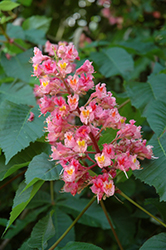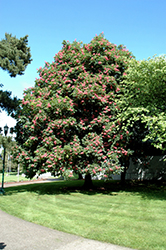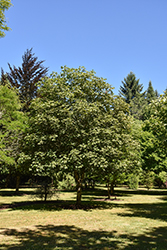Ruby Red Horse Chestnut
Aesculus x carnea 'Briotti'
Height: 40 feet
Spread: 40 feet
Sunlight:
![]()
![]()
Hardiness Zone: 4
Other Names: Briotti Horse Chestnut
Description:
A hybrid small tree with very prominent upright panicles of red flowers in spring; ideal for many landscape applications, makes a great accent tree for smaller landscapes; spiny seeds are few and far between for easier maintenance over other varieties
Ornamental Features
Ruby Red Horse Chestnut features bold spikes of ruby-red flowers rising above the foliage in mid spring. It has dark green deciduous foliage which emerges light green in spring. The palmate leaves turn yellow in fall. However, the fruit can be messy in the landscape and may require occasional clean-up.
Landscape Attributes
Ruby Red Horse Chestnut is a dense deciduous tree with a more or less rounded form. Its relatively coarse texture can be used to stand it apart from other landscape plants with finer foliage.
This tree will require occasional maintenance and upkeep, and is best pruned in late winter once the threat of extreme cold has passed. It has no significant negative characteristics.
Ruby Red Horse Chestnut is recommended for the following landscape applications;
- Accent
- Shade
Planting & Growing
Ruby Red Horse Chestnut will grow to be about 40 feet tall at maturity, with a spread of 40 feet. It has a low canopy with a typical clearance of 4 feet from the ground, and should not be planted underneath power lines. It grows at a medium rate, and under ideal conditions can be expected to live for 60 years or more.
This tree does best in full sun to partial shade. It prefers to grow in average to moist conditions, and shouldn't be allowed to dry out. It is not particular as to soil type or pH. It is highly tolerant of urban pollution and will even thrive in inner city environments. This particular variety is an interspecific hybrid.


